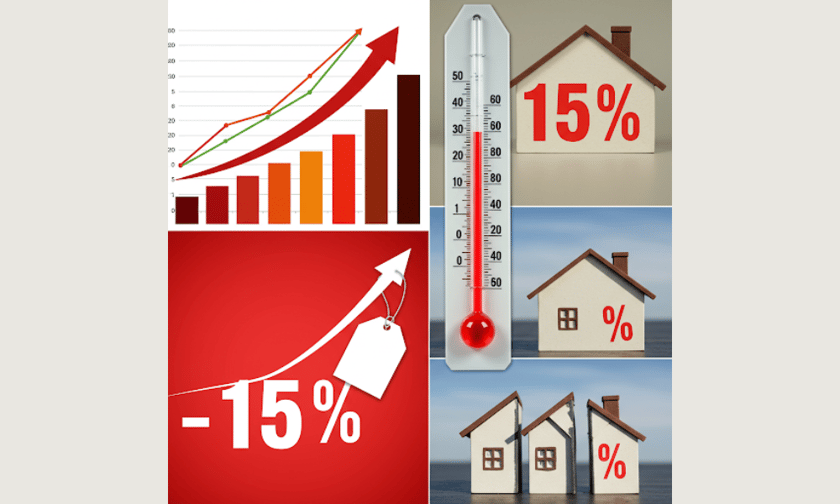

Concerns are mounting regarding Prime Minister Anthony Albanese's expanded First Home Guarantee Scheme.
If re-elected this May, Albanese's camp said he would let first-time buyers purchase a home with a deposit as low as 5%, sans the current income and property price caps.
But while aspiring homeowners rejoiced, industry experts have expressed mixed reactions. SQM Research managing director Louis Christopher called Albanese's proposed plan inflationary. He said it wouldn't solve the nation's housing shortage, but would inevitably lead to increased market demand — and higher prices. Christopher told the AFR that it would increase property prices by as much as 15%.
Meanwhile, Pauline Blight-Johnston, chief executive officer of Helia, Australia's largest provider of mortgage insurance, called the proposed scheme "a risk to lenders," while expressing fears that the plan could shrink the LMI market.
"It's still important that the LMI industry is around to support investors and upgraders who will need access to LMI," Blight-Johnston told local news outlet Gold Coast Bulletin.
The current First Home Guarantee Scheme allows eligible first-time buyers to purchase a property with a deposit as low as 5%. The government guarantees the other 15% of the deposit. This eliminates the need for lenders mortgage insurance (LMI), a significant upfront cost for borrowers with small deposits. A larger deposit also potentially puts borrowers in a position to obtain a more favorable interest rate.
The program has been lauded for helping Australians — many of whom would not otherwise be able to save for a 20% deposit — achieve homeownership sooner. The updated version of the plan will remove income caps: $125,000 for individuals and $200,000 for couples. Depending on the state, price caps on the loan amount will also be lifted.
"This is going to help more people get into the market with a smaller deposit, which is fantastic. Because at the moment, given the way the price caps are for the schemes, they are very limiting," Queensland-based Luke Ashby, finance specialist and mortgage broker at Emerge Finance, told Australian Broker. "The [current] income cap threshold kicks a lot of people out of the criteria to be able to use the scheme. And obviously you can't save as quickly as the market is moving at the moment."
"Anything that allows more people to come into the market sooner is a good thing for anybody linked to the property industry,” said Daniel O'Brien, founder and broker at NSW-based PFS Financial Services. “And obviously, for as a consumer, getting them out of paying rent sooner is a good thing as well. I see nothing but positives for [the proposed scheme]."
Critics, however, argue that the suggested updates would introduce a new set of challenges for lenders, including increased risk of loans. In the event of a market downturn, lenders could face higher default rates and potentially larger losses on guaranteed loans. LMI protects lenders against losses when borrowers default on high loan-to-value ratio mortgages. Although the government acts as a guarantor, the administrative burden and potential for disputes could still impact lenders, some argue.
The Insurance Council of Australia (ICA) recently voiced concerns about the expansion of the scheme, warning that it could "increase systemic financial risk" and potentially expose taxpayers to billions of dollars in losses in the event of a housing downturn. The ICA argues that the scheme should be more targeted towards those in genuine need, such as single parents and key workers in regional areas, rather than being universally applied to all first-time buyers.
But brokers seem to be backing the plan.
"Obviously it's more money that the lender is lending. But the banks are still getting a guarantee from the government. So it's not really any more risk," Ashby said. "The banks will still lend the money. It doesn't matter where the guarantee or security is coming from. The banks still have to do their serviceability checks, make sure that they're a good applicant and that they have the income to be able to service that debt.
"It's probably more risk for the government than the lender," he added.
Currently, only a handful of banks participate in the scheme, including major banks Commonwealth Bank (CBA), National Australia Bank (NAB) and Westpac, in addition to more than two dozen smaller banks. CBA Bank declined to comment on the proposed scheme. NAB and Westpac did not return requests for comment.
Meanwhile, some lenders are offering unique solutions to help first-time buyers enter the market amid ongoing affordability challenges. Non-bank lender Pepper Money, which is currently not a Home Guarantee Scheme participant, recently said it was eliminating LMI, lenders protection fees (LPF) and risk fees on prime full-documentation property loans with its limited-time Prime Time Flex Bomb promo.
"Australians work hard to achieve the dream of owning their own home, but saving for a deposit and paying LMI remains a huge challenge," said Barry Saoud, Pepper Money general manager for mortgages and commercial lending. "The flexibility we’re offering eliminates the need to pay thousands of dollars upfront for mortgage insurance, making home ownership more affordable at a time when this is a real challenge."
Non-bank lender Bluestone Home Loans chief commercial officer Tony MacRae added: "Bluestone supports any move that helps more Australians into a home. We’ve always backed borrowers outside the traditional mould, and that won’t change with politics."
Bluestone is also not currently a participant of the housing scheme. But the non-bank has removed LMI barriers across its products. "So that part is business as usual for us," MacRae said. "The real challenge here will be lenders' ability to offer 95% [loan-to-value] loans."
